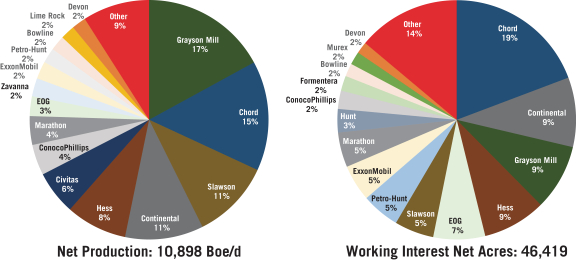Fuel conservation measures and related governmental initiatives, technological advances and negative shift in market perception towards the oil and natural gas industry could reduce demand for oil and natural gas.
Fuel conservation measures, alternative fuel requirements, increasing consumer demand for alternatives to oil and natural gas, technological advances in fuel economy and energy generation devices, and the increased competitiveness of alternative energy sources could reduce demand for oil and natural gas. Additionally, the increased competitiveness of alternative energy sources (such as wind, solar, geothermal, tidal, fuel cells and biofuels) could reduce demand for oil and natural gas and, therefore, our revenues.
Our business could also be impacted by governmental initiatives to encourage the conservation of energy or the use of alternative energy sources. For example, in November 2021, the Biden Administration released “The Long-Term Strategy of the United States: Pathways to Net-Zero Greenhouse Gas Emissions by 2050,” which establishes a roadmap to net zero emissions in the United States by 2050 through, among other things, improving energy efficiency; decarbonizing energy sources via electricity, hydrogen, and sustainable biofuels; and reducing non-CO2 GHG emissions, such as methane and nitrous oxide. In addition, in August 2022, Congress passed, and President Biden signed, the Inflation Reduction Act of 2022. The Inflation Reduction Act of 2022 includes a variety of clean-energy tax credits and establishes a program designed to reduce methane emissions from oil and gas operations. These initiatives or similar state or federal initiatives to reduce energy consumption or encourage a shift away from fossil fuels could reduce demand for hydrocarbons and have a material adverse effect on our earnings, cash flows and financial condition.
Additionally, certain segments of the investor community have recently expressed negative sentiment towards investing in the oil and natural gas industry. Recent equity returns in the sector versus other industry sectors have led to lower oil and natural gas representation in certain key equity market indices. Some investors, including certain pension funds, university endowments and family foundations, have stated policies to reduce or eliminate their investments in the oil and natural gas sector based on social and environmental considerations. Furthermore, certain other stakeholders have pressured commercial and investment banks to stop funding oil and natural gas projects. With the continued volatility in oil and natural gas prices, and the possibility that interest rates will continue to rise in the near term, increasing the cost of borrowing, certain investors have emphasized capital efficiency and free cash flow from earnings as key drivers for energy companies, especially shale producers. This may also result in a reduction of available capital funding for potential development projects, further impacting our future financial results.
The impact of the changing demand for oil and natural gas services and products, together with a change in investor sentiment, may have a material adverse effect on our business, financial condition, results of operations and cash flows. Furthermore, if we are unable to achieve the desired level of capital efficiency or free cash flow within the timeframe expected by the market, our stock price may be adversely affected.
Increased attention to ESG matters may impact our business.
Increasing attention to climate change, increasing societal expectations on companies to address climate change, increasing investor and societal expectations regarding voluntary ESG disclosures, and increasing consumer demand for alternatives to oil and natural gas may result in increased costs, reduced demand for our products, reduced profits, increased investigations and litigation, and negative impacts on our access to capital markets. Increasing attention to climate change and any related negative public perception regarding our industry, for example, may result in demand shifts for natural gas and oil products, increased litigation risk, and increased regulatory, legislative and judicial scrutiny, which may, in turn, lead to new state and federal safety and environmental laws, regulations, guidelines and enforcement interpretations.
In addition, organizations that provide information to investors on corporate governance and related matters have developed ratings processes for evaluating companies on their approach to ESG matters. Such ratings are used by some investors to inform their investment and voting decisions. Unfavorable ESG ratings and recent activism directed at shifting funding away from companies with energy-related assets could lead to increased negative investor sentiment toward us and our industry and to the diversion of investment to other industries, which could have a negative impact on our stock price and our access to and costs of capital. Also, institutional lenders may, of their own accord, elect not to provide funding for fossil fuel energy companies based on climate change related concerns, which could affect our access to capital for potential growth projects.
45

